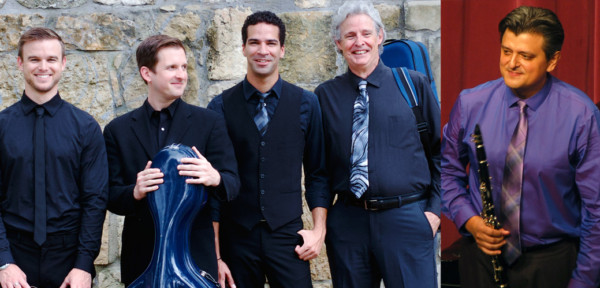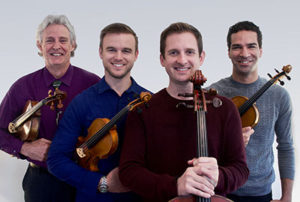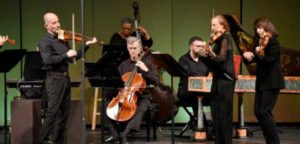CLARINET QUINTETS
Wednesday, June 8, 2022 | noon
First United Methodist Church
407 N Bridge St
SAMUEL COLERIDGE-TAYLOR (1875-1912)
Clarinet Quintet in F-sharp minor, Op. 10
- Allegro energico
- Larghetto affettuoso – Molto espressivo
- Allegro leggiero
- Allegro agitato – Poco più moderato – Vivace
JOHANNES BRAHMS (1883-1897)
Clarinet Quintet in B-minor, Op. 115
- Allegro
- Adagio
- Andantino
- Con moto
Vanguel Tangarov, clarinet
Patrice Calixte, violin
Helen Cooper, violin
Bruce Williams, viola
Douglas Harvey, cello

Sponsors
Dr. & Mrs. James Grumman
Linda Patterson
Rhea & Fred Fry
This concert is generously supported by our concert sponsors and by donors to the Victoria Bach Festival’s Annual Fund. Many thanks to our generous supporters!
About the Artists

Dr. Vanguel Tangarov is an associate professor of clarinet at Texas State University and an artistic director and founder of the annual international clarinet event Texas State Clarinet Fiesta. Vanguel Tangarov performs as a principal clarinetist for the Austin Opera, Mid-Texas Symphony, and Victoria Symphony orchestras.
Tangarov previously served as principal clarinet of the Sofia Philharmonic Orchestra, Bulgaria, Academia Chigiana Symphony Orchestra, Italy, Jeunesses Musicales World Symphony Orchestra, Germany and the Monterrey Symphony Orchestra (OSUANL) in Mexico. He has appeared as a soloist with the Mid-Texas Symphony in USA, the Plovdiv Philharmonic, the Rousse Philharmonic, the Varna Philharmonic and the Sofia Philharmonic orchestras in Bulgaria, the Constanta Philharmonic in Romania, the Monterrey Symphony (OSUANL) and Monterrey Chamber Orchestra in Mexico, presenting music by Mozart, Weber, Copland, Francaix, Cimarosa, Giampieri, Bernstein and Pipkov.
Vanguel Tangarov has performed in more than 20 countries on four continents, winning a positive critical acclaim. Equally popular as a soloist, recitalist, and chamber musician, he has performed in important venues worldwide, such as Berliner Filharmoniker Hall (Berlin), Gewandhaus (Leipzig), Schauspielhaus (Berlin), Concertgebouw (Amsterdam), Oslo Konserthaus (Norway), Cadogan Hall (London), Symphony Hall Birmingham (UK), Boston Symphony Hall (USA), Bulgaria Hall (Sofia), and Zaragoza Hall (Spain), to name a few.
Tangarov studied clarinet with Dimitar Boyanov at the Dobrin Petkov Music High School for gifted students in his native country. He continued his education at the National Academy of Music “Prof. Pancho Vladiguerov,” in Sofia, Bulgaria, where he received a Bachelor of Music and Master of Music degree in clarinet performance under the direction of renowned pedagogue and concert artist, Petko Radev, a former principal clarinet of Teatro Alla Scala, Milan, Italy.
Tangarov received his Doctor of Musical Arts degree from The University of Texas at Austin under the direction of Richard MacDowell. He has also received instruction from musicians such as Aurelian Octav Popa, Rumania, and Gerald Pahinger, principal clarinetist of Vienna Symphony. Tangarov’s solo appearances include recitals at the 2018 Neo-Path International Festival; the 10th Aniversary Season Bulgarian Concert Evenings at New York, 2015, a solo recital at the Bulgarian Embassy in Washington DC; many performances at the 2018, 2017, 2016, 2014, and 2010 International Clarinet Fests in Ostende, Belgium; Orlando, Florida, Lawrence, Kansas, Baton Rouge, Louisiana, and Austin, TX , as well as a performance at the opening ceremony of the 2014 International Plovdiv Chamber Music Competition in Bulgaria. Tangarov’s performance of Bela Bartok’s Contrasts with the violinist Elmira Darvarova, a former concertmaster of the Metropolitan Opera, New York, and Bojidar Noev, the former head of the piano department of Innsbruck, Austria, was broadcasted for the Bulgarian National Radio.
He can be heard as a principal clarinetist on Circus Maximus by John Corigliano (Naxos) with The University of Texas at Austin Wind Ensemble; Samuel Barber: An American Romantic (Harmonia Mundi) with Conspirare, Craig Hella Jonson and Company of Voices; GRAMMY-nominated Considering Matthew Shepard (Harmonia Mundi) with Conspirare, Craig Hella Jonson and Company of Voices; the soundtrack for the movie Knight of Cups, directed by Terrence Malik, and more than ten other recordings.
Tangarov has been recognized and awarded numerous prizes in both national and international clarinet competitions including: Prague Spring International Competition, 1996, 6th place overall, United Nations International Clarinet Competition, Portugal, 1994, 4th place overall, First International Clarinet Competition, Romania, 1993, 2nd prize, “The Music and the Earth” International Chamber Music Competition, Bulgaria, 1993, 3rd prize, Bulgarian National Clarinet Competition for French Music, Bulgaria, 1997, 1st prize, Brahms Academy Competition for Chamber Music, Bulgaria, 1993, 2nd prize; Bulgarian National Radio-Mozart Chamber Music Competition, 1991, clarinet quintet, 1st prize, and Bulgarian National Clarinet Competition, Bulgaria, 1990, 1st prize.
Vanguel Tangarov is a Buffet Group & Vandoren Performing Artist and exclusively performs with Buffet Crampon’s clarinets and Vandoren’s products.

The Artisan Quartet has performed widely around central Texas including at the Victoria Bach Festival, the Mozart Festival Texas since 2012 (appointed Quartet in Residence in 2014), the Blanco (Texas) Performing Arts Association Series, the Twilight Series (Jonestown/Lago Vista), the Santa Cecilia Series (Austin), Texas State University (San Marcos), and the Salon Concert Series (San Antonio). In 2013, the Artisan’s completed their three season long “Genius at Play” Series, featuring the complete string quartets of Beethoven.
The group recorded portions of composer David Hamburger’s film score for Mat Hames’ documentary about Barbara Conrad Smith, the legendary Metropolitan Opera singer. The film, entitled “When I Rise” premiered to a standing ovation at its premiere during the SxSW film festival in Austin in March 2010 and aired February 2011 on PBS’s “Independent Lens” series. The film DVD is available for purchase from www.shoppbs.org.
MidAmerica Productions, Inc. invited the Artisan Quartet to make its Carnegie Hall debut performing on the Carnegie Hall Weil Recital Hall Chamber Music Series on March 22nd, 2012. The Artisan received a standing ovation for their sold out performance and rave reviews. The concert in New York was made possible with very generous gifts from the Classical Artist Development Foundation and the Amatius Foundation, and was commemorated by the Texas House of Representatives on March 13, 2013 with H.R. 703 read into the Texas Congressional Record with the Artisans present.
In collaboration with the Austin Symphony Orchestra, the quartet created the Artisan Quartet Series starting in 2012. This exciting chamber music series has features the greatest works in the string quartet and chamber music repertoire and has provided music lovers in Austin wonderful concerts in an intimate setting.
The Artisan Quartet is the Quartet in Residence for both the Mozart Festival Texas in San Antonio and the Texas Bach Festival in Georgetown, where one of their members is the Director of Chamber Music. The Artisan has also joined forces with the Odeon Preservation Association in Mason, Texas to create the Mason Chamber Music Festival. The MCMF held its sixth season in April, 2022.
Spotlight on the Clarinet
London-born prodigy Samuel Coleridge-Taylor (1875–1912) entered the Royal College of Music at the age of fifteen. After starting violin studies with his African father, a descendant of American slaves relocated by the British to Sierra Leone, Coleridge-Taylor was later mentored by English musical icon Edward Elgar.
In Coleridge-Taylor’s time, Brahms was incorporating Hungarian folk music into his compositions and Dvořák was incorporating his native Bohemian music. Following these nationalist impulses, Coleridge-Taylor celebrated his own Afro-British heritage, but he was also open to other cultures, exploring the legacies of Native Americans, and people of Ethiopia, Japan, Spain, and Haiti.
Another major influence on Coleridge-Taylor’s work began with his attendance as the youngest delegate to London’s 1900 Pan-African Conference. There he met American poet Paul Laurence Dunbar and scholar/activist W.E.B. DuBois, founder/editor of Crisis, the official magazine for the NAACP. The goal of this international congress, part of a series that continues today, was to work toward peace, equality, and decolonization of African nations. Following three tours of the US with his Song of Hiawatha cantata trilogy, where he was in contact with Booker T. Washington, Coleridge-Taylor was invited to the White House by President Theodore Roosevelt to honor his service to music and to race relations.
The ominous first movement of this quintet echoes some of Dvořák’s melodic emotion and Mahler’s lush textures, but the powerful voice is Coleridge-Taylor’s own. The larghetto clearly references American spirituals, which also influenced Dvořák in his New World Symphony. In the scherzo, a Beethoven invention, Coleridge-Taylor blends the clarinet seamlessly into the dark mood of the string texture and, like Beethoven, stretches the barriers of contrast. The intense final movement suggests a unique take on Native American themes he would later use in his opus 30 Hiawatha cantata, which sometimes rivaled Handel’s Messiah for popularity among British choral groups. Written in 1895, when he was only twenty, opus 10 has the clear mark of a mature composer whose voice is well-established. This is fortunate for posterity because Coleridge-Taylor died of pneumonia at the age of 37.
Although Coleridge-Taylor was just beginning his short career when he wrote his quintet, Johannes Brahms (1833–1897) had all but retired from his long career when he heard clarinetist Richard Mühlfeld in performance. The clarinet developed later than its woodwind predecessors due to the technological changes in instrument building in the nineteenth century, but Brahms was so enthused at Mühlfeld’s playing that he made up for the clarinet’s lost time by composing, practically back to back, two sonatas, a trio, and this program’s magnificent quintet.
The quintet was written in 1891, just six years before Brahms died, only four years before Coleridge-Taylor’s quintet, and only two years after Mozart’s quintet—one of the first major works for the clarinet and a work that influences this concert’s compositions. The quintets by Mozart, Brahms, and Coleridge-Taylor all feature the standard sonata form of four movements: the first movement, allegro; the second, slow; and the third in tripartite minuet or scherzo form, with the fourth having the option of either blazing fast or elegant moderato.
Brahms’ allegro contains his signature mix of elegance and emotion. The adagio highlights his ability to layer rhythms into a disquieting foundation for touching melodies. The marking for his andantino is semplice [simple] reminiscent of his famed “Lullaby.” Like Coleridge-Taylor, he smoothly blends the clarinet into the rich texture. The final con moto theme and variations has touches of folk melody lines, stormy 19th-century emotionalism, and the maturity of swirling waltzes. In this piece, and this program, the baby of the woodwinds proves it has indeed come of age.
London-born prodigy Samuel Coleridge-Taylor (1875–1912) entered the Royal College of Music at the age of fifteen. After starting violin studies with his African father, a descendant of American slaves relocated by the British to Sierra Leone, Coleridge-Taylor was later mentored by English musical icon Edward Elgar.
In Coleridge-Taylor’s time, Brahms was incorporating Hungarian folk music into his compositions and Dvořák was incorporating his native Bohemian music. Following these nationalist impulses, Coleridge-Taylor celebrated his own Afro-British heritage, but he was also open to other cultures, exploring the legacies of Native Americans, and people of Ethiopia, Japan, Spain, and Haiti.
Another major influence on Coleridge-Taylor’s work began with his attendance as the youngest delegate to London’s 1900 Pan-African Conference. There he met American poet Paul Laurence Dunbar and scholar/activist W.E.B. DuBois, founder/editor of Crisis, the official magazine for the NAACP. The goal of this international congress, part of a series that continues today, was to work toward peace, equality, and decolonization of African nations. Following three tours of the US with his Song of Hiawatha cantata trilogy, where he was in contact with Booker T. Washington, Coleridge-Taylor was invited to the White House by President Theodore Roosevelt to honor his service to music and to race relations.
The ominous first movement of this quintet echoes some of Dvořák’s melodic emotion and Mahler’s lush textures, but the powerful voice is Coleridge-Taylor’s own. The larghetto clearly references American spirituals, which also influenced Dvořák in his New World Symphony. In the scherzo, a Beethoven invention, Coleridge-Taylor blends the clarinet seamlessly into the dark mood of the string texture and, like Beethoven, stretches the barriers of contrast. The intense final movement suggests a unique take on Native American themes he would later use in his opus 30 Hiawatha cantata, which sometimes rivaled Handel’s Messiah for popularity among British choral groups. Written in 1895, when he was only twenty, opus 10 has the clear mark of a mature composer whose voice is well-established. This is fortunate for posterity because Coleridge-Taylor died of pneumonia at the age of 37.
Although Coleridge-Taylor was just beginning his short career when he wrote his quintet, Johannes Brahms (1833–1897) had all but retired from his long career when he heard clarinetist Richard Mühlfeld in performance. The clarinet developed later than its woodwind predecessors due to the technological changes in instrument building in the nineteenth century, but Brahms was so enthused at Mühlfeld’s playing that he made up for the clarinet’s lost time by composing, practically back to back, two sonatas, a trio, and this program’s magnificent quintet.
The quintet was written in 1891, just six years before Brahms died, only four years before Coleridge-Taylor’s quintet, and only two years after Mozart’s quintet—one of the first major works for the clarinet and a work that influences this concert’s compositions. The quintets by Mozart, Brahms, and Coleridge-Taylor all feature the standard sonata form of four movements: the first movement, allegro; the second, slow; and the third in tripartite minuet or scherzo form, with the fourth having the option of either blazing fast or elegant moderato.
Brahms’ allegro contains his signature mix of elegance and emotion. The adagio highlights his ability to layer rhythms into a disquieting foundation for touching melodies. The marking for his andantino is semplice [simple] reminiscent of his famed “Lullaby.” Like Coleridge-Taylor, he smoothly blends the clarinet into the rich texture. The final con moto theme and variations has touches of folk melody lines, stormy 19th-century emotionalism, and the maturity of swirling waltzes. In this piece, and this program, the baby of the woodwinds proves it has indeed come of age.
About the Artists

Dr. Vanguel Tangarov is an associate professor of clarinet at Texas State University and an artistic director and founder of the annual international clarinet event Texas State Clarinet Fiesta. Vanguel Tangarov performs as a principal clarinetist for the Austin Opera, Mid-Texas Symphony, and Victoria Symphony orchestras.
Tangarov previously served as principal clarinet of the Sofia Philharmonic Orchestra, Bulgaria, Academia Chigiana Symphony Orchestra, Italy, Jeunesses Musicales World Symphony Orchestra, Germany and the Monterrey Symphony Orchestra (OSUANL) in Mexico. He has appeared as a soloist with the Mid-Texas Symphony in USA, the Plovdiv Philharmonic, the Rousse Philharmonic, the Varna Philharmonic and the Sofia Philharmonic orchestras in Bulgaria, the Constanta Philharmonic in Romania, the Monterrey Symphony (OSUANL) and Monterrey Chamber Orchestra in Mexico, presenting music by Mozart, Weber, Copland, Francaix, Cimarosa, Giampieri, Bernstein and Pipkov.
Vanguel Tangarov has performed in more than 20 countries on four continents, winning a positive critical acclaim. Equally popular as a soloist, recitalist, and chamber musician, he has performed in important venues worldwide, such as Berliner Filharmoniker Hall (Berlin), Gewandhaus (Leipzig), Schauspielhaus (Berlin), Concertgebouw (Amsterdam), Oslo Konserthaus (Norway), Cadogan Hall (London), Symphony Hall Birmingham (UK), Boston Symphony Hall (USA), Bulgaria Hall (Sofia), and Zaragoza Hall (Spain), to name a few.
Tangarov studied clarinet with Dimitar Boyanov at the Dobrin Petkov Music High School for gifted students in his native country. He continued his education at the National Academy of Music “Prof. Pancho Vladiguerov,” in Sofia, Bulgaria, where he received a Bachelor of Music and Master of Music degree in clarinet performance under the direction of renowned pedagogue and concert artist, Petko Radev, a former principal clarinet of Teatro Alla Scala, Milan, Italy.
Tangarov received his Doctor of Musical Arts degree from The University of Texas at Austin under the direction of Richard MacDowell. He has also received instruction from musicians such as Aurelian Octav Popa, Rumania, and Gerald Pahinger, principal clarinetist of Vienna Symphony. Tangarov’s solo appearances include recitals at the 2018 Neo-Path International Festival; the 10th Aniversary Season Bulgarian Concert Evenings at New York, 2015, a solo recital at the Bulgarian Embassy in Washington DC; many performances at the 2018, 2017, 2016, 2014, and 2010 International Clarinet Fests in Ostende, Belgium; Orlando, Florida, Lawrence, Kansas, Baton Rouge, Louisiana, and Austin, TX , as well as a performance at the opening ceremony of the 2014 International Plovdiv Chamber Music Competition in Bulgaria. Tangarov’s performance of Bela Bartok’s Contrasts with the violinist Elmira Darvarova, a former concertmaster of the Metropolitan Opera, New York, and Bojidar Noev, the former head of the piano department of Innsbruck, Austria, was broadcasted for the Bulgarian National Radio.
He can be heard as a principal clarinetist on a Naxos Label recording titled Circus Maximus by John Corigliano with The University of Texas at Austin Wind Ensemble, Harmonia Mundi Label, Samuel Barber: An American Romantic, Conspirare, Craig Hella Jonson and The Company of Voices, Harmonia Mundi Label, 2017 GRAMMY Nominated, Craig Hella Johnson: “Considering Matthew Shepard”, as well as the soundtrack for the movie Knight of Cups, directed by Terrence Malik, in addition to being on more than 10 other recordings.
Tangarov has been recognized and awarded numerous prizes in both national and international clarinet competitions including: Prague Spring International Competition, 1996, 6th place overall, United Nations International Clarinet Competition, Portugal, 1994, 4th place overall, First International Clarinet Competition, Romania, 1993, 2nd prize, “The Music and the Earth” International Chamber Music Competition, Bulgaria, 1993, 3rd prize, Bulgarian National Clarinet Competition for French Music, Bulgaria, 1997, 1st prize, Brahms Academy Competition for Chamber Music, Bulgaria, 1993, 2nd prize; Bulgarian National Radio-Mozart Chamber Music Competition, 1991, clarinet quintet, 1st prize, and Bulgarian National Clarinet Competition, Bulgaria, 1990, 1st prize.
Vanguel Tangarov is a Buffet Group & Vandoren Performing Artist and exclusively performs with Buffet Crampon’s clarinets and Vandoren’s products.

The Artisan Quartet has performed widely around central Texas including at the Victoria Bach Festival, the Mozart Festival Texas since 2012 (appointed Quartet in Residence in 2014), the Blanco (Texas) Performing Arts Association Series, the Twilight Series (Jonestown/Lago Vista), the Santa Cecilia Series (Austin), Texas State University (San Marcos), and the Salon Concert Series (San Antonio). In 2013, the Artisan’s completed their three season long “Genius at Play” Series, featuring the complete string quartets of Beethoven.
The group recorded portions of composer David Hamburger’s film score for Mat Hames’ documentary about Barbara Conrad Smith, the legendary Metropolitan Opera singer. The film, entitled “When I Rise” premiered to a standing ovation at its premiere during the SxSW film festival in Austin in March 2010 and aired February 2011 on PBS’s “Independent Lens” series. The film DVD is available for purchase from www.shoppbs.org.
MidAmerica Productions, Inc. invited the Artisan Quartet to make its Carnegie Hall debut performing on the Carnegie Hall Weil Recital Hall Chamber Music Series on March 22nd, 2012. The Artisan received a standing ovation for their sold out performance and rave reviews. The concert in New York was made possible with very generous gifts from the Classical Artist Development Foundation and the Amatius Foundation, and was commemorated by the Texas House of Representatives on March 13, 2013 with H.R. 703 read into the Texas Congressional Record with the Artisans present.
In collaboration with the Austin Symphony Orchestra, the quartet created the Artisan Quartet Series starting in 2012. This exciting chamber music series has features the greatest works in the string quartet and chamber music repertoire and has provided music lovers in Austin wonderful concerts in an intimate setting.
The Artisan Quartet is the Quartet in Residence for both the Mozart Festival Texas in San Antonio and the Texas Bach Festival in Georgetown, where one of their members is the Director of Chamber Music. The Artisan has also joined forces with the Odeon Preservation Association in Mason, Texas to create the Mason Chamber Music Festival. The MCMF held its sixth season in April, 2022.




